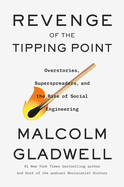
Twenty-five years ago, Malcolm Gladwell published his first book, The Tipping Point, which identifies how small changes can cause major shifts. With Revenge of the Tipping Point: Overstories, Superspreaders, and the Rise of Social Engineering, he revisits the conclusions of that work, expanding and adapting them to current trends and mindsets. In an introductory note, Gladwell (Talking to Strangers; Outliers) explains how his debut "was a hopeful book that matched the mood of a hopeful time." While Revenge of the Tipping Point retains a positive focus, this highly engaging work conveys different signs for a different time: a sense of responsibility, a call for change, and an underlying concern for the consequences of inaction.
Throughout, Gladwell employs the strength of great teachers: an ability to distill complex ideas into accessible lessons. Such is the case with the overstory, a metaphor referring to the highest layer of tree-canopy coverage, "way up in the air, in many cases outside our awareness." It's what might be meant when someone claims there's "something in the water." But for Gladwell, it's not merely a hunch or vague feeling; instead, it "is specific. It is tied to a place. It is powerful. It shapes behavior. And it does not emerge out of nowhere. It happens for a reason." Revenge of the Tipping Point explains how and why it happens.
With that knowledge comes responsibility, of course. Noting the potential risks and rewards of social engineering, when people are "intentionally orchestrating the course of contagious behavior," Gladwell asserts, this knowledge can be a tool, one with the ability "to build a better world." --Sara Beth West, freelance reviewer and librarian

